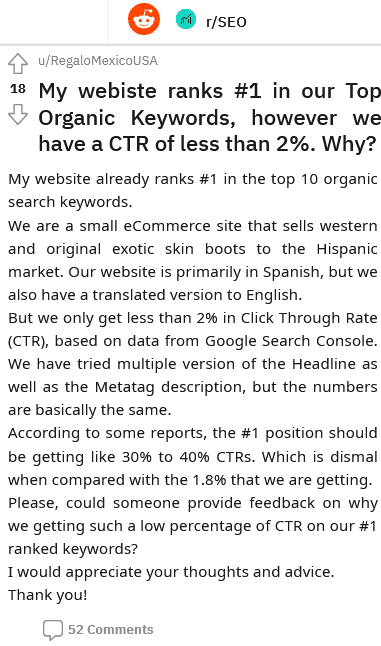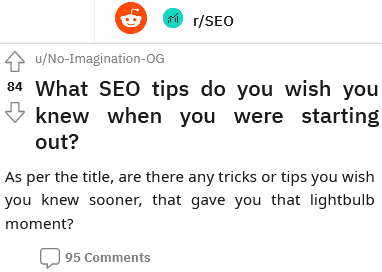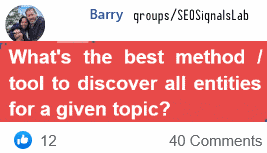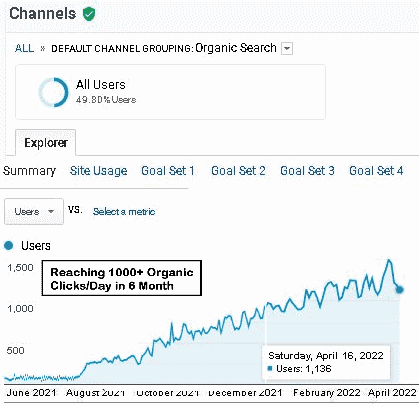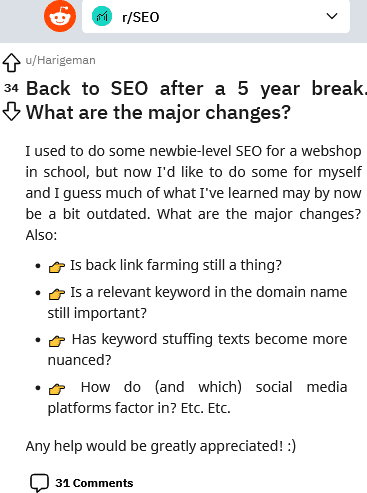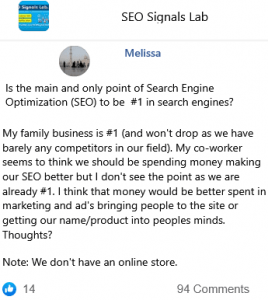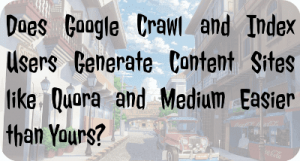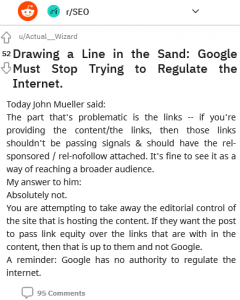Query Rewriting
When Keywords are not Keywords
I do see a lot of people in SEO genuinely struggling, (or worse, just getting it completely wrong without any struggle at all), to get their heads around Query Rewriting, Synonyms, and Knowledge based searches.
I have literally seen scores of 'SEO users' writing out Frequently Asked Questions (FAQ) pages that include questions they've gathered where the question relates to stuff well known in the knowledge graph. I mean, writing out the actual question like it was a regular query to match as per SEO ten years ago.
Or the one that I'm seeing everywhere right now, and facepalming hard with embarrassment every single time I see it is SEO users including "Near me" in their keywords hoping to get local searches using that term.
That's not how query rewriting, or knowledge based search works.
Let's start with something really easy. You do a search for "How tall is Barack Obama?"
Google sees this query, recognizes that it is of the type asking for a fact response, and will provide a nice little knowledge box at the very top of results.
It doesn't do that because Google employed 800,000,000 devs to type in every possible question and answer into a database, or even make a list of all questions that are asking for fact-based answers. It's all done automatically through better understanding the query, and then rewriting it to get better results.
It recognizes that Barack Obama is an entity, partly based on Click Through Rate (CTR) data over millions of previous searches. It recognizes that this is a common question format (Who, How, What, Where, When, etc?) and so it doesn't look for that who, where, what, as a keyword, but rather looks for the ANSWER part to that. Google knows you are not searching for the QUESTION you just asked, but for the answer.
So the top organic results I get in the SERP (below the knowledge box) is for Wikipedia –
https://en.wikipedia.org/wiki/Heights_of_presidents_and_presidential_candidates_of_the_United_StatesThis page includes the words "How tall" entirely accidentally, just once, in the small print of the citation links right at the bottom of the page. Because despite being *in* the original query, they are not 'keywords' that sort of query will look for on a page.
The second highest result for the query doesn't have the words "How tall" in the page at all.
https://www.potus.com/presidential-facts/presidential-heights/Now, it is true that having FAQ pages can help Google to associate entities with the facts about those entities without having to use schema markup. But that just helps Google put the facts into the Knowledge Graph. It won't help you rank for a search that Google rewrote into something else anyway.
I bring this whole topic up after writing a fairly long comment response a little earlier. Here's what I said there, if you didn't see it.
Query rewriting is a very tough thing to grasp. Take for example how widespread it has become for SEO users who haven't really thought things through to be using the keyword "near me" in their page.
In reality, of course, when Google see the words "near me" in a query, they know it means the user wants highly localised results to their current location, and *rewrites* the 'near me' into whatever the location is as close as Google can determine it.
So if you are on a smartphone, stood on the Corner of Main and 31st street, and search for "pizza restaurant near me" Google rewrite that into a Local search for "pizza restaurant close to Main and 31st, or by your GPS coordinates. If you were on a laptop at home, Google would (if you were logged into your Google profile) pull your home data from your profile. If not logged in, then it will estimate the location as best it can by ISP or whatever.
But never, in any circumstances, is Google going to be looking for pages that include the *words* "near me" in them. That's not how it works. I see literally thousands of sites getting this wrong, including some pretty big players.
But it is this rise of query rewriting that means a lot of smarter SEO users are moving away from the now outdated approaches to 'keywords'. No longer is the whole phrase, the whole query, a keyword phrase, but rather, there are keywords within any search that Google will generally match to entities in the knowledge graph, and use synonyms wherever appropriate.
So "Pizza restaurant near me" may actually get rewritten to "Pizza restaurant (or any other synonym for a dining establishment that offers pizza in its menus or is associated with pizza in reviews) around [user location here]"…
To cope with this change and fluidity, which is no more than we've done all our lives when dealing with other humans, tools such as Inlinks (
https://inlinks.net/p/category/case-studies/ ) become particularly useful, helping you to map out the 'fact fingerprint' of an entity and its associations.Remember, what the Link Graph does/did for links, is what the Knowledge Graph is doing for facts and information.
79 👍🏽10 💟89
📰👈
Ammon Near Me
🤭5
Ammon ✍️ 🎓
Incidentally, stuff like this is precisely where understanding coding helps massively. Anyone who codes is likely to be familiar with 'tokens', strings and variables. And thus a little better able to instinctively see where a particular word in a query may not be used as that keyword, but as a token for some other value or thing.
I have one question.. suppose my keyword is what is lms tool so how.much time I repeat this on a whol article
🤭
Ammon ✍️ 🎓 » Pandey
Are you asking how many times to repeat a phrase that includes "What is" after reading the above post that explains exactly why "what is" isn't a keyword you have to include at all?
🤭
Adam J. Humphreys
You forgot ‘Why' and ‘It depends.' FAQs are still pretty important and it works pretty well if more in depth. I am not a fan of thin one line zinger content. I have seen a very powerful agency using near me and I didn't quite understand that one at all ever. In terms of localized city keywords in exact match I often struggle with that because I want to assume they are further along but absolutes still seem to help.
I didn't forget, I just used 'etc.' to skip covering Why, Which, Whence, Whither, Wherefore… 😃
🤭4
Adam J. Humphreys » Ammon
If the above was pertaining to my earlier statement yesterday I am referencing sales copy more so than FAQs which unless fully formed seem like a big waste to me.
Ammon ✍️ 🎓 » Adam J. Humphreys
The main use of an FAQ page for me is usually where a client wants to reduce Customer Service calls and emails. But we all know how rarely *anyone* will RTFM 😃
🤭3
Adam J. Humphreys » Ammon
I have been trying to explain this to a dental group's concierge with mixed results 😆 Usually one liners and I am like no this isn't adequate. What would you tell a family considering spending 25% more with a pedodontist over a family dentist? Sometimes during meetings I ask these things and it comes out amazing. Other times you think why bother?
Ammon ✍️ 🎓 » Adam J. Humphreys
That's the trouble with dentists and content – they always just want to do a quick filling. 😃
🤭6
Slawski
This paper covers query rewriting well and canonical queries:https://research.google/pubs/pub41894/
Biperpedia: An Ontology for Search Applications – Google Research
💟9
It really does feel as if the knowledge graph has been kicked up a gear (possibly more than one) lately. Which is why I have my very strong suspicion that the Core Update this time around enabled greater growth, and use, of it. Just like Hummingbird seemed to set the infrastructure for greater growth and use of query rewriting. Have you felt the same sort of thing?
Slawski » Ammon
Those seem to be what Jason Bernard seems to be saying – he is tracking updates to the knowledge graph. Google changed my entity type around 4 weeks ago from "American Entrepreneur" to " Search Engine Technology.". It's more accurate. Hard to tell being so close to it, how quickly it is changing.
Andrew 🎓 » Slawski
Solid share! About halfway through. It takes forever when you aren't a specialist in their field to make sure you're understanding what they say.
Slawski » Andrew
It was eye-opening in a few places, like when they mentioned canonical queries. Glad you liked it.
Ammon ✍️ 🎓
>> eye opening
I knew it! Finally, documentary proof that Bill is so familiar with reading Google patents now that he can do it with his eyes closed! 😃
Slawski » Ammon
I love when someone at Google tweets that they have made a change, and I look up patents and it is right there:
https://gofishdigital.com/clustered-news-results-at-google/Clustered News Results at Google – Go Fish Digital
Jeff
Drives me nuts… I try my best to teach my UCLA students how this stuff works, but then I'm sent evaluation copies of new textbooks for my class that have assignments that include stuff like this, "You decide that you'll focus your keyword research on key search terms that are searched often during the season and would make the local business appealing, like "last-minute," "local," "near me," "easy," and "quick." If your business caters to a particular demographic, be sure to utilize those less competitive terms like "gifts for mom near [city name]", "gifts for men near [city name]", and "childrens gifts near [city name]". This is a new book! With stuff that looks like it's from the 1990s!
🤯3
It makes me wonder if there are actually thousands of websites out there with "site:" as a keyword somewhere in the footer of every page, you know, so they can search for it to see how many pages are indexed… 😃
🤭2
📰👈
A Client is Asking for Target Numbers Involving Organic Keywords and Traffic within Few Months
Num of My Visitor is so lower than the Search Volume a month. Why?


